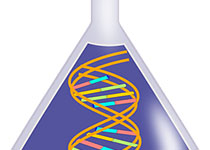Release date: 2018-01-09

With the deepening of research in the field of genes, gene editing technology has been highly anticipated in medical treatment. In gene editing, CRISPR gene editing technology is called "gene magic scissors" because of its fast, efficient and high degree of freedom. In the past, CRISPR has not lived up to our expectations, let us see another breakthrough.
Recently, however, a team led by pediatric hematologists Matthew Porteus and Kenneth Weinberg of Stanford University found a deadly flaw in CRISPR-Cas9 that could lead to treatment failure: leading to autoimmunity!
In the early morning of this day, "Nature" also expressed his opinion on this report.
The latest research shows that Cas9 antibodies are ubiquitous in humans!
The research team led by Matthew Porteus found in the latest research that Cas9 protein homologous antibodies were found in 70% of the population, and more than half of them have antigen-specific T cells of their homologs! This result means that humoral immunity and cellular immunity of Cas9 protein exist in the human body, and if treated with CIRSPR-Cas9, the therapeutic effect is not necessarily as good as people expected, and may even cause intense human body. immune response!
In this study, the researchers selected a total of 22 cord blood and 12 healthy adult blood for analysis. What is surprising is the experimental results:
Generally speaking, in cord blood, 79% have SaCas9 antibody; 65% have SpCas9 antibody! In further research, the researchers were in a healthy ergonomics, and 71% also had SaCas9 antibodies! This means that in the human body, the natural immune system will greatly reduce the effect of CRISPR-Cas9 gene therapy!
Since we mentioned the immune response, we have to mention how Cas9 works.
CRISPR: How Cas9 works
CRISPR-Cas9 is an original immune system that was originally discovered in microorganisms. This gene editing system relies on an enzyme called Cas9 that cleaves DNA at a site determined by the sequence of a particular RNA strand. Therefore, researchers can change the sequence of the guide RNA so that it can cleave specific DNA fragments, which can be used to treat diseases with certain specific gene mutations.
Unfortunately, foreign proteins such as Cas9 can also cause long-lasting immune responses. As early as 1999, an American boy died of a feverish market due to intense immune rejection during gene therapy. And today, this study also tells us that foreign proteins in the gene editing system may cause human immune rejection.
Gene editing immune problem: the degree of attention is far from enough!
Until now, the immune response is still a daily paralysis that organ transplantation is difficult to cross. In the process of gene editing, immune rejection has not received enough attention.
Gene therapy researchers are familiar with the threat posed by immune responses and sometimes screen patients for potential responses to gene therapy components before treatment.
Therefore, testing for such immune responses may be part of any serious effort to develop CRISPR-Cas9 therapy, especially if the developer plans to apply to the US Food and Drug Administration and other regulatory agencies for approval to sell their treatment.
Thomas Barnes, senior vice president of Intellia Therapeutics in Cambridge, Mass., is evaluating the immune response to genetic editing systems in rodents and non-human primates.
Even so, immune rejection, which may be caused by genetic editing, is rarely mentioned in the mass media and scientific literature. Porteus said: "I have been researching researchers interested in developing CRISPR-Cas9-based therapies, but they rarely study immune rejection. If we use genetic editing techniques to treat patients, patients have severe immune rejection. The reaction leads to accidents, which may make the frontier of gene editing technology extremely embarrassing. My research is to hope that everyone will look to this field instead of rushing into the clinic."
Gene editing: Will it be broken?
In this regard, Dr. Porteus also put forward his own opinion: "The field of gene editing is like the new world door that God has opened for mankind. I believe people will be keen on research in this field, but may find new ways to achieve it. Gene editing."
Regardless of how the future of genetic editing is developing, it is undeniable that this research has led to a significant decline in the market value of a large number of genetic editing companies. The market has completed its basic functions. And research is still on the road.
Source: Translational Medicine Network
Fluorescence Immunoassay ,POCT,Fluorescence Immunoassay Analyzer
Shenzhen Uni-medica Technology Co.,Ltd , https://www.unimedicadevice.com